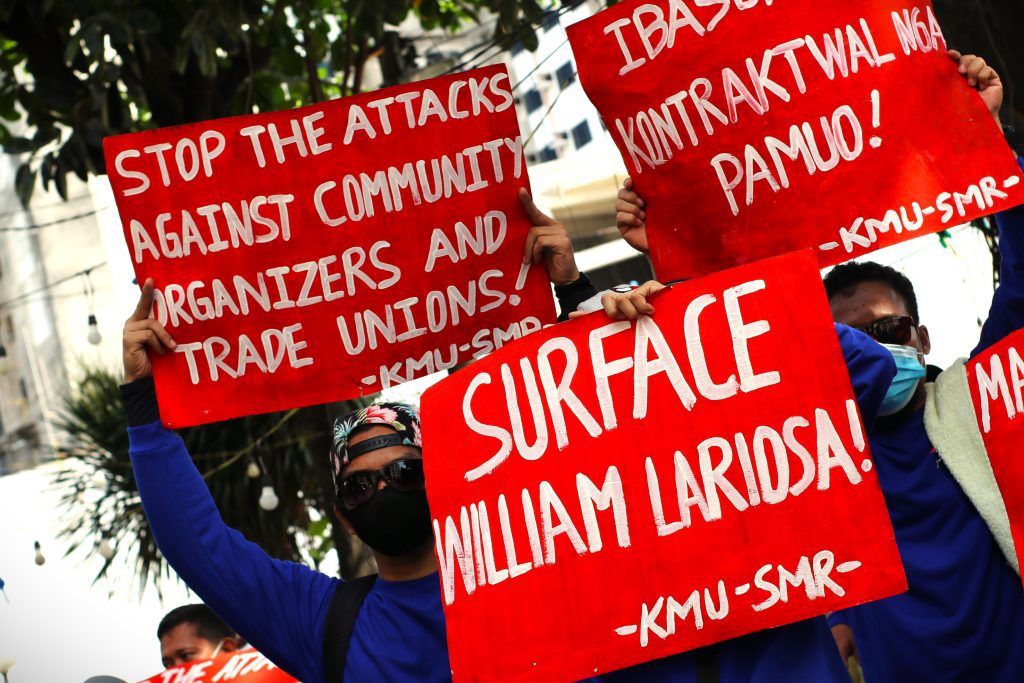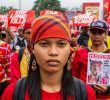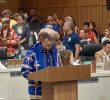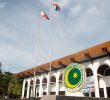
DAVAO CITY, Philippines – Journalists, NGO workers, and union organizers are disputing the position of President Ferdinand Marcos Jr. that he will not dissolve the National Task Force to End Local Communist Armed Conflict (NTF-ELCAC), which has been known for red-tagging individuals and groups since its formation in 2018.
The president made his position after the recent Supreme Court ruling on the case of former Bayan Muna Representative Siegfred Deduro vs Major Gen. Vinoya, which concluded that “red-tagging, vilification, labeling, and guilt by association threaten a person’s right to life, liberty, or security.”
But Marcos Jr believes that it is not the NTF-ELCAC who is doing the red-tagging.
“Ang sinasabi, dahil mayroon raw red-tagging na ginagawa. Hindi naman gobyerno gumagawa nuon. Kung sino-sinong iba ang gumagawa noon (They said the task force is doing red-tagging. It’s not government who’s been doing that, but other people),” Marcos was quoted during an interview during his visit to Cagayan de Oro last May 16.
Marcos Jr. further said that the task force still has activities in barangays that need to be accomplished, such as projects for rebel returnees.
His statement is supported by National Security Council Assistant Director General Jonathan Malaya, who said in an interview that the SC ruling did not point out the task force as responsible for red-tagging.
“The NTF-ELCAC is not a party to the case nor was it impleaded, so why is it being linked to this decision boggles the mind,” Malaya was quoted.
The NTF-ELCAC was created by former President Rodrigo Duterte through Executive Order 70 in 2018, after calling off peace talks with the National Democratic Front.
But various groups have documented incidents of red-tagging involving military officers, spokespersons, and alleged agents of NTF-ELCAC.
The labor center Kilusang Mayo Uno (KMU) Southern Mindanao has documented recent harassment of its leaders and union organizers:
– Around November 2023, their secretary general, Paul John Dizon, was approached at his house by people who identified themselves as NTF-ELCAC agents. They warned Dizon to surrender to authorities or else he would face legal charges.
– Between April 23 to 28, 2024, KMU-SMR’s former secretary general, Carlo Olalo was also visited in his residence by elements of the Philippine Army’s 10th Infantry Division which also gave a similar warning to “clear his record.”
Around that same time, a local union leader in Compostela, Davao de Oro, Melodina Gumanoy, was also approached at her residence by military personnel.
– On April 10, 2024, labor organizer William Lariosa was reportedly taken by soldiers in Quezon, Bukidnon, and remains missing. The family said Lariosa had been harassed and tracked by suspicious elements for years in the Davao region that forced him to leave for Bukidnon.
The National Union of Journalists (NUJP) recently released their study on red-tagging on journalists, where state forces are involved.
– Since 2016, NUJP documented at least 159 incidents of red-tagging against journalists and media organizations. Half of these are committed by state agents, including its use of social media and posters that red-tagged members of mainstream and alternative press.
– The state presented a matrix that red-tagged persons and groups including media during the Duterte administration. The matrix has been debunked and criticized.
– Social media pages of Philippine National Police units are documented to have issued posts accusing activists of being rebels or terrorists.
– Lorraine Badoy-Partosa and Jeffrey Celiz, who were spokespersons of the NTF-ELCAC, “resorted to McCarthyist hysteria” through a regular televised show in a network in 2022 where they red-tagged activists, progressive lawmakers, and even a judge and an organizer of the community pantry. The network reportedly had a partnership agreement with the Philippine Army since 2022.
Non-governmental organizations (NGOs) and civil society groups gathered in a forum last week in Manila to point out how red-tagging and terror-tagging by the state affected their services to communities mostly in rural areas.
One of these NGOs criticized how the Anti-Money Laundering Council is acting as “judge, jury, and executioner in issuing financial sanctions” such as freezing bank accounts of NGOs by mere terror tagging.
Ronalyn Olea, secretary general of NUJP, wrote an opinion piece in Bulatlat.com that said “By defending the existence of the NTF-ELCAC, Marcos makes red-tagging a policy, and provides a go-signal for other human rights violations that often happen after victims have been labeled.”
She noted that up to March 2022, the human rights group Karapatan revealed that 427 activists were red-tagged before they were killed.
Olea points out that even the United Nations Special Rapporteurs who had visited the Philippines have called for the disbandment of the NTF-ELCAC.
While Marcos Jr remains not to heed these calls, NGOs and NUJP both raise similar calls of the need for a policy to expand, respect, and protect civic space of media and NGOs.
“On the ground, activists, human rights defenders, and journalists are pushing back, asserting the right to organization, right to free speech and expression and right to seek redress for grievances. These rights have been fought for, and still being fought for every day,” Olea said. (davaotoday.com)
Human Rights, NTF-ELCAC, philippines, Red-tagging








